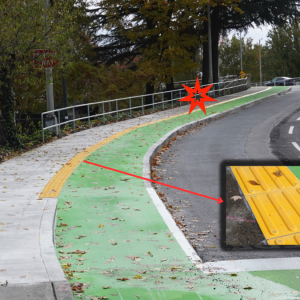“We just think this is an unnecessary ordinance and is really unenforceable.”
— Randy Schoen, Medford police chief in the Mail Tribune newspaper
In the southern Oregon city of Medford, local lawmakers have decided to repeal an ordinance that required bicycles to have a license.
According to a story in the Mail Tribune yesterday, the ordinance was lifted by Medford City Council because it was difficult to enforce and it lacked a clear community benefit. The paper also reported that in the past 15 years, only one or two of the $195 citations had been issued.
Medford police Chief Randy Schoen supported the Council’s decision. He told the Tribune:
“It was rarely enforced… There are so many people commuting on bicycles who don’t live in Medford… We just think this is an unnecessary ordinance and is really unenforceable. It really doesn’t work in the best interest of our community.”
The ordinance was meant to help police track stolen bikes. They still encourage the licensing for that reason, but now it’s a voluntary, opt-in system.
Licensing — to track bikes or their operators — is a commonly suggested idea by people who want more accountability and regulation for bicycles. However, I have yet to hear of any city with a successful bike licensing program. I wasn’t aware of Medford’s law, but perhaps when the idea comes up again, we can use their experiences to educate people about this issue.
Read the full article here.







Thanks for reading.
BikePortland has served this community with independent community journalism since 2005. We rely on subscriptions from readers like you to survive. Your financial support is vital in keeping this valuable resource alive and well.
Please subscribe today to strengthen and expand our work.
Wow, I’m surprised to hear that Medford even had that ordinance. This is definitely good news, though. Just goes to show how something as ridiculous as licensing and regulating simple means of transportation such as bicycles would never work.
There must be a better way to track stolen bicycles.
Lost/stolen tracking: How about microchips? Works for pets!
I’d be interested in hearing from someone, say…a Medford resident, someone that worked on the ordinance..that has a personal knowledge of how Medford came to have its now repealed bike registration ordinance.
Was creation of the ordinance brought about simply to help police track stolen bikes? Of course, police…and owners of bikes that have been stolen…want to catch thieves. Other usual reasons for implementing the frequently suggested bike registration and ‘Bike Licensing’ ideas, is to ‘Get bicyclists to pay for what they use.’ And of course to respond to the complaints some people make that. ‘Bicyclists are freeloaders.
How likely is it that the creation of Medford’s bike licensing ordinance did not have any of those ideas pushing it? If creation of the ordinance was due in part to people wishing to see bikes burdened as such, what might their thoughts about the situation be now?
All very good questions, wsbob. A few more to add:
How many cyclists are there in Medford?
How many “commuters” use bicycles outside of Medford to get to Medford?
How many did in 1995 (when the ordinance originated)?
I’ve just never thought of Medford as the type of city that would have a strong cycling community, nor as a place that people “commuted to”. They have a population of 63,000, which is 20,000 less than Bend, OR, which is a tiny town.
How would microchips be any different than licensing? Chip instead of sticker? It would still cost money (more so)and requires registering with some “official” group.
Or are we talking voluntary vs. mandatory?
I think there’s a healthy cycling community down there…afterall the bike mechanic school is in Ashland.
I’ve been riding in Medford and the Rogue Valley for a long time and wasn’t even aware of this ordinance until I read it in the paper this morning. I haven’t lived in Medford for 5 years, I work and commute into Medford every day.
The Rogue Valley has a fairly large cycling population, but Medford itself isn’t especially cycling friendly. There are plenty of riders who commute to or from the outlying towns (Ashland, Jacksonville etc) but getting around in Medford isn’t fun for inexperienced riders. Medford is bigger than you give it credit for – the population was pushing 80,000 last I saw and the metro population is over 200,000.
Hmmm…sounds kinda like how the Vancouver bike helmet ordinance got adopted with little interest in enforcing it…perhaps it will be short lived too [unless funded].
There are many adult Oregonians and Clark County residents who bike commute to Vancouver for work…and ‘have to’ pack a helmet once they cross the line.
Grants Pass also used to have a bicycle ‘licensing’ program. It was free and voluntary. It too was geared towards recovery of stolen bikes. In addition to a sticker on the seat tube, a number was hammer-stamped on the bottom bracket,then then recorded in a ledger book. But then this was before the existence of computer databases. Ours went the way of the dodo several years ago.
In addition to microchips, I wonder if RFID tags would work. I seem to recall reading that the Dutch or Danish authorities were using RFID readers to inspect whole yards full of bicycles quickly for any reported as stolen.
We experimented with RRID in bike frames. Didn’t work well when the tag was inside the frame, and putting it on the outside defeats the purpose.
How do they enforce it when people don’t register their cars? or don’t they?
you get a bunch of tickets and then finally they suspend your license and then later when you are ticketed for driving suspended they suspend it again. and then eventually you die, either before or after killing someone with your car.
Greetings from Copenhagen.
A service with the express intent of helping people track down stolen bikes, by stamping bottom-brackets has been in effect here for decades. All bikes meant for sale on the danish market must have a stamped serial (it’s done in the factory, so little extra cost), but it hardly does anything to help people track down their bike – it only helps in proving ownership.
As such, the number is only registered when the bike is stolen. Recovery is minimal.
Last year, RFID-tags encased in rear reflectors where given out freely (and in this case, people got registered upon receipt of reflector), and the clever thing here is that parking-attendants are equipped with a passive RFID-reader with a GPS. At the end of their workday, they upload the data, and if your bike is reported stolen, and has been scanned, you receive an email with GPS-coordinates (translated to an approximate address) and can then go and retrieve your bike.
The service is free, for now.
No stoplights have been equipped with RFID-readers, and the people behind the project have said that they do not support the idea that the system could be used to monitor citizens.
How about a pedal lock, you have a chip implanted in your b@# and the bike won’t work unless the right person is sitting on it
I heard of a guy that didn’t want to carry keys anymore so he programed a chip and put it in his arm to open his house door and other things (car?)
This sets an awesome precendent.
Jim (#16) that was a professor of cybernetics/computing or somesuch at the University of Warwick (UK). He had it removed after proving that the technology could work
someday big bro will probably want to inject you with a chip for atm/credit debit card